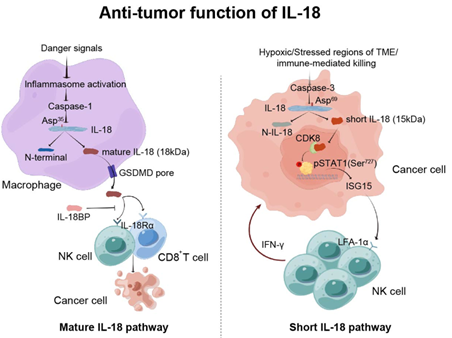In a study published in Nature Immunology on January 31, Prof. MENG Guangxun from the Shanghai Institute of Immunity and Infection (SIII) of the Chinese Academy of Sciences, and Prof. LIU Chen-Ying from Xinhua Hospital, Shanghai Jiao Tong University School of Medicine, unveiled a novel mechanism whereby a short form of IL-18, generated by caspase-3 cleavage in tumor cells, activates NK cells to suppress tumor growth, offering new therapeutic opportunities.
Response rates in treating various solid tumors remain suboptimal, highlighting the urgent need to understand the immune evasion mechanisms of tumors and develop innovative treatment strategies. NK cells are increasingly recognized for their potential in cancer immunotherapy due to their rapid response, broad anti-tumor activity, and minimal toxicity. However, tumors employ various mechanisms to evade immune surveillance, such as reducing the expression of key immune modulators, including IL-18.
IL-18 is produced as an inactive precursor (pro-IL-18) and requires cleavage by caspase-1 to become the mature, active form. The mature IL-18 is mainly secreted by immune cells and activates them for tumor control through IL-18 receptor-mediated signaling. However, this process is often inhibited by the decoy receptor IL-18 binding protein (IL-18BP).
In this study, researchers focused on IL-18 and discovered that tumor cells can produce a novel short form of IL-18 via caspase-3 cleavage, independent of the traditional mature IL-18 pathway. Unlike mature IL-18, this short form does not exit the cell but instead enters the nucleus, where it promotes STAT1 phosphorylation and ISG15 secretion, which in turn enhances NK cell anti-tumor function.
This discovery is particularly relevant to colorectal cancer, where short IL-18 is negatively correlated with tumor progression in clinical samples. Intriguingly, short IL-18 promotes NK cell anti-tumor activity by modulating key signaling pathways, revealing a novel and unexpected mechanism through which IL-18 strengthens immune responses in the tumor microenvironment.
“This finding challenges our previous understanding of IL-18. By identifying the role of short IL-18 in activating NK cells, it opens up new possibilities for developing targeted immunotherapies that may complement existing treatments,” said Prof. MENG.
This study advances the understanding of IL-18’s role in cancer immunotherapy and suggests that new therapeutic strategies can be developed to enhance the efficacy of NK cell-based immunotherapies.

Figure. Schematic model summarizing the anti-tumor mechanisms of mature IL-18 and short IL-18, created by Figdraw. (Image by SIII)
Reference: https://www.nature.com/articles/s41590-024-02074-7
Link of CAS: https://english.cas.cn/newsroom/research_news/life/202502/t20250205_899507.shtml

